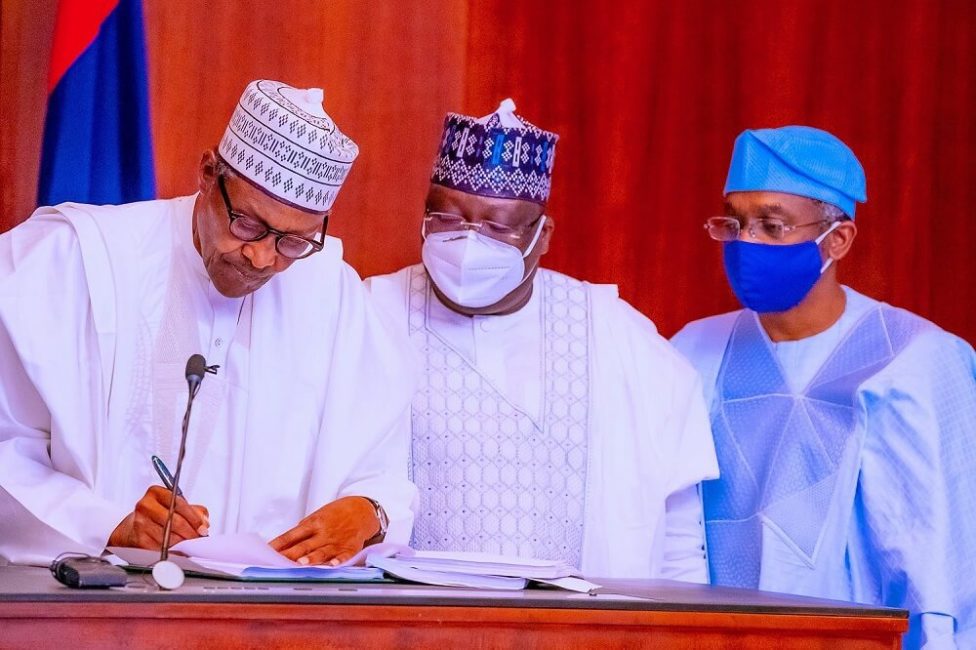Amaechi, Ngige, Akpabio, 10 Other Ministers Have To Make Decisions After New Electoral Act
With the signing into law of the Electoral Bill few days ago by President Muhammadu Buhari, high profile members of his cabinet who have political ambitions for 2023 have urgent decisions to make.
Not less than 13 ministers and 12 aides have so far been identified as having ambitions to contest elective offices either as president, governor, senator or member of the House of Reps.
Advertisement
But the Electoral Act 2022 will now push them to quickly make up their minds or risk losing out. The Act, especially Section 84 (10-13) reads, “No political appointee at any level shall be a voting delegate or be voted for at the convention or congress of any political party for the purpose of the nomination of candidates for any election.
“Where a political party fails to comply with the provisions of this act in the conduct of its primaries, its candidate for election shall not be included in the election for the particular position in issue.
“Notwithstanding the provisions of this Act or rules of a political party, an aspirant who complains that any of the provisions of this Act and the guidelines of a political party have not been complied with in the selection or nomination of a candidate of a political party for election may apply to the Federal High Court for redress.
“Nothing in this section shall empower the courts to stop the holding of primaries or general elections under this Act pending the determination of a suit.”
Advertisement
The provisions clearly forbid aspirants who’re political appointees to vote and be voted for while also denying them the privilege to be delegates.
Although President Buhari tasked the National Assembly to quickly amend the section, it’s unlikely the lawmakers will do that because of time.
Also, the time table for the conduct of 2023 election released by the Independent National Electoral Commission, INEC, is not favourable to the amendment.
According to the INEC time table, political parties are mandated to conduct their primaries into all elective positions between April 4 and June 3.
The ruling All Progressives Congress, APC, holds its National Convention on the 26 of March. The party’s constitution also provides in Section 31 for any party official who wants to contest an elective office to resign 30 days to the primary.
Advertisement
This development is casting dark clouds on some ministers and aides in the current government of Buhari, who fear the new Electoral Act, if not quickly amended will work against them.
Some of the ministers who have already indicated interest for various positions are Minister of Transportation, Mr Rotimi Amaechi, Minister of Labour and Productivity, Mr Chris Ngige, and Minister of Niger Delta Affairs, Mr Godswill Akpabio, all interested in succeeding Buhari as president.
Others are Minister of Youth and Sports Development, Mr Sunday Dare and his counterparts in the Ministry of Science and Technology, and that of State for Mines and Steel Development, Messrs Ogbonnaya Onu and Uchechukwu Sampson Ogah.
The Minister of State for Labour and Employment, Festus Keyamo, is also hoping to become APC’s governorship candidate for Delta State while the Minister of State for Petroleum Resources, Mr Timipre Sylva is interested in the senate.
The Minister of State for Education, Emeka Nwajiuba is hoping to clinch the party’s governorship ticket for Imo State.
The Minister of Communications and Digital Economy, Mr Isa Pantami and Minister of Works and Housing Babatunde Fashola also have political interests.
Advertisement
There is also the Central Bank Governor, Mr Godwin Emefiele, whose popularity has been rising recently due to agitations from various groups for him to contest for the Nigerian number one job.
The Director-General of Press and Media Affairs to Chairman of the APC Caretaker Committee, Mr Mamman Mohammed, however said the party had no option than to stick to INEC’s time table.
He said the party was not in a position to favour any particular aspirant adding that, “The electoral act is meant for all political parties. If you don’t do it, you will lose out. So, the APC will work within the confines of the law and the provisions of the electoral act.
“Obviously, the party will work hard to see that it meets up with the time as stipulated by the law and the 2023 election timetable.”
A source close to the Minister of Transportation was coy when approached for comment on the plans by the minister to run for president.
He said, “There is a time table, right? And the minister has told you he wants to contest? The new Act (Electoral) provides that he will have to resign first, right? And our party’s constitution says he has to resign one month to the convention too, right?
“Everything is in order. Don’t worry about the minister. If he will contest, he will follow the law,” he said, adding that, “There is enough time for the minister to choose the best approach possible to contest for the presidency.”
The National Secretary, Caretaker Extraordinary Convention Planning Committee, CECPC, of the APC, Mr John Akpanudoedehe, did not respond to calls and text messages sent to his phone for comment.
Akpanudoedehe is also vying to get the APC’s governorship ticket for Akwa Ibom State.
On the part of the major opposition, the PDP, its National Publicity Secretary, Mr Debo Ologunagba told THE WHISTLER that the party will fully comply with applicable timetable as released by INEC.
“The party will at the appropriate time, within the time limit stipulated by law, do the needful by producing its candidates for elections.
“All parties and stakeholders, all participants in the process must obey it,” he said.



